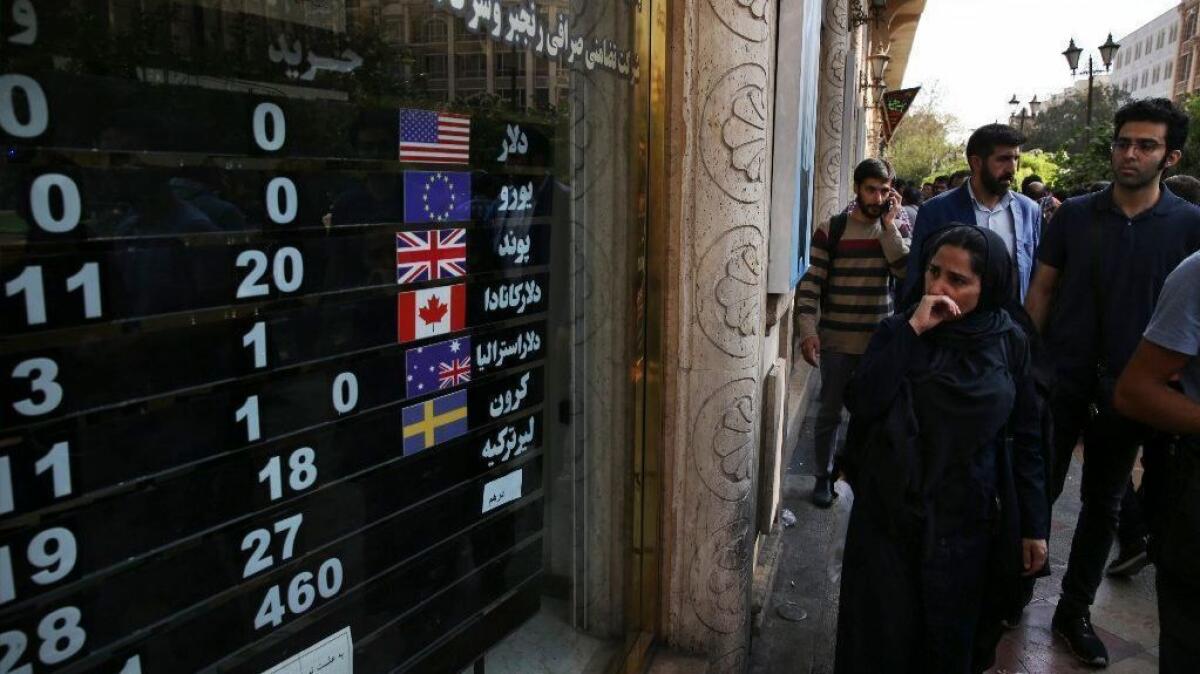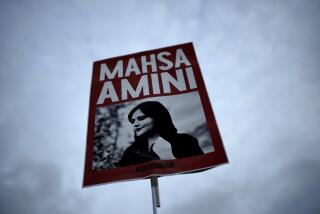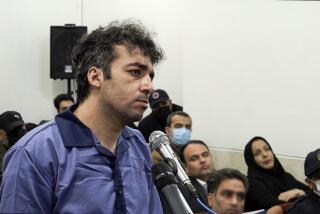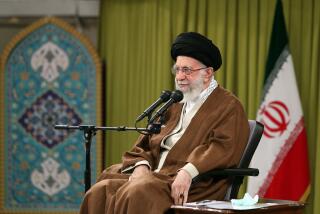Two men hanged in Iran for hoarding gold coins as the country wages war on economic crimes

- Share via
Reporting from Tehran — Signaling zero tolerance for economic crimes, Iran hanged two financial traders who were convicted of stockpiling gold coins and profiteering during a currency crisis, state media reported Wednesday.
Vahid Mazloumin, dubbed the “sultan of coins,” and Mohammad Esmaeel Qasemi, an accomplice, were hanged in the predawn hours just two months after their trial in front of a newly established court focused on financial cases, the semiofficial Tasnim news agency said.
They and a third person were swiftly convicted of “spreading corruption on earth,” which is punishable by death in Iran’s Islamic legal system. Death sentences for Mazloumin and Qasemi were upheld by Supreme Court in October; the third convict’s appeal is pending.
They were among scores of petty financial traders and others arrested in a sweeping crackdown on Tehran’s vast black market in gold coins and hard currency. Mazloumin, 58, was detained in July for hoarding two tons of gold coins, state media said.
The traders did a brisk business for the first half of the year as Iran’s chronic fiscal mismanagement — coupled with the renewal of U.S. economic sanctions — drove the currency, the rial, to its lowest levels ever against the dollar.
Many Iranians traded their cash and other belongings for dollars and gold. The panic came on top of years of calamities at private banks and credit unions, which are collapsing due to bad loans and robbing retirees of their savings.
Amid rising public anger at the scarcity of diapers, medicines and other basic goods, the Iranian government blamed small-time traders for manipulating the currency markets and launched police raids on warehouses believed to be stockpiling consumer items.
In August, with the backing of Supreme Leader Ayatollah Ali Khamenei, special courts were set up to quickly dispose of cases involving economic crimes. At least seven people have reportedly been sentenced to death, with some trials broadcast on television.
Last month, the spokesman for Iran’s judiciary, Gholamhossein Mohseni Ejehi, said that 196 currency dealers had been arrested and indictments had been issued against 49 defendants. Ejehi warned of a “severe crackdown” on the black market and said anyone caught illegally dealing in currencies was “playing into the enemy’s hands.”
That was a reference to the United States, which this month reintroduced sanctions against Iran’s energy and banking sectors — while carving out exemptions for Iran’s largest oil importers — to punish what the Trump administration calls regional terrorism by the Islamic Republic.
Iran executed at least 507 people in 2017, one of the highest figures in the world, according to Amnesty International. Several currency dealers were executed during a previous economic crash in 1993.
While the recent hangings were aimed at redirecting public anger, they “will have no impact on the currency crisis,” said Saeed Laylaz, an economic analyst in Tehran.
“The flight of capital from Iran will intensify, along with insecurity for investors, and in the medium to long term it’s discouraging for any investor to accumulate assets inside Iran,” Laylaz said.
The busy commercial streets surrounding the British and Turkish embassies in downtown Tehran, where many legal and illegal currency dealers operate, were quiet in the hours after the hangings were announced.
Just a day earlier, traders said, about 130 small-time currency and gold dealers were arrested in downtown and the nearby Grand Bazaar. The rial was trading at 12,900 to the dollar on Wednesday, slightly better than the day before — but down from about 40,000 a year ago.
Many said the gain would be short-lived. One 50-year-old trader, who like others asked not to be identified because of the crackdown, described Mazloumin and Qasemi as ordinary people trying to turn a small profit in a nose-diving economy.
“The money we deposited in so-called private banks or credit unions isn’t paid back to us, and the owners of those banks aren’t punished, but two honest businessmen are hanged?” the trader said.
“If the rial wasn’t so devalued, they could have invested in the stock market or established factories … but if I am a rich investor I would be stupid to invest here.”
Special correspondent Mostaghim reported from Tehran and Times staff writer Bengali from Singapore.
Shashank Bengali covers Iran for The Times. Follow him on Twitter at @SBengali
More to Read
Sign up for Essential California
The most important California stories and recommendations in your inbox every morning.
You may occasionally receive promotional content from the Los Angeles Times.











